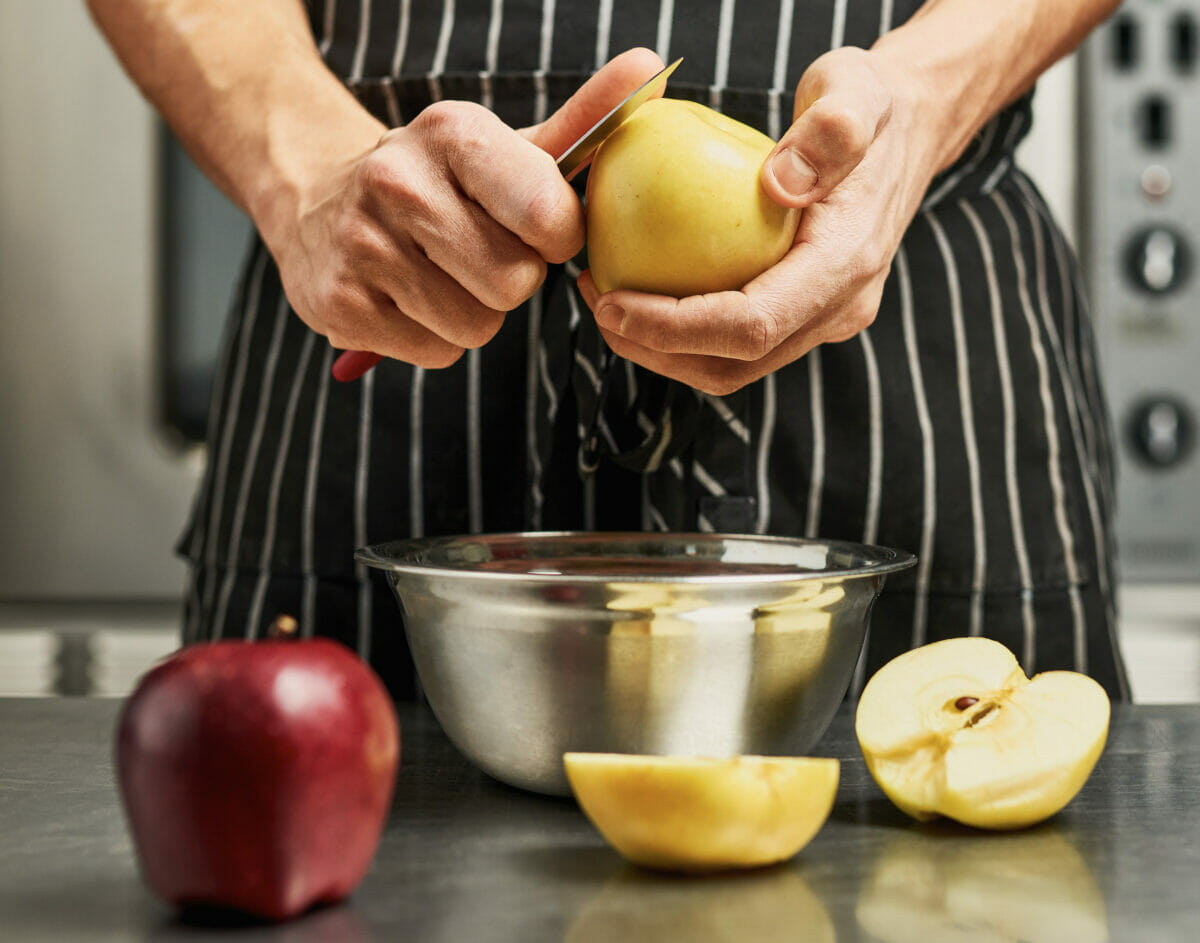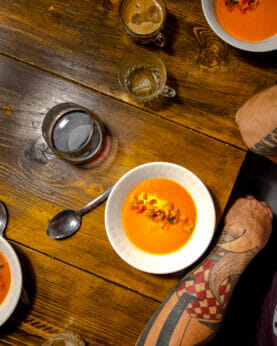Meet the Dumpster-Diving Chef Who Turns Food Waste Into Jam
A dumpster dive led to the innovation of a non-profit organization that distributes what would otherwise have been food waste and gives it new life in marmalades and sauces.
Meet the Dumpster-Diving Chef Who Turns Food Waste Into Jam
A dumpster dive led to the innovation of a non-profit organization that distributes what would otherwise have been food waste and gives it new life in marmalades and sauces.

Chef Guillaume Cantin turns discarded apples into sauces and jams.by Thanh Pham
It started as a dare between friends. Could the Montreal chef, Guillaume Cantin, take a dumpster dive and create a gourmet meal from the waste he found?
Working in restaurant kitchens for 17 years—he started at age 15 and worked his way up to chef, winning the first season of Radio Canada’s Les Chefs!—and always up for an epicurean challenge, Cantin (literally) dove into the adventure with relish when his friend, Thibault Renouf, suggested the idea in 2016.
“I went behind a grocery store and jumped into the dumpsters,” says Cantin. “I wasn’t surprised as much by the quantity of food I found, but I was surprised by the quality. If something isn’t edible, it’s understandable to throw it away, but what we found was beautiful food, still in the package.”
Cantin won the dare with gusto. From two dumpsters at separate grocery stores, he found so much quality food that he was able to prepare nearly 100 meals. Since there was an abundance of fruits and vegetables, the menu Cantin created reflected the bounty. He prepared a red pepper soup that was garnished with spicy hummus and small dices of orange, red and yellow peppers. For the main course, the duo served roasted lettuce with a lettuce cream, quinoa, pomegranate and sage. And for dessert, he made a pan seared “pain perdu” (a type of bread pudding) with coffee-cumin yogurt and slices of yellow plums.
It was a veritable feast, sourced from two dumpsters.

That first dive into a dumpster opened Cantin’s eyes. Shortly thereafter, Cantin and Renouf sat down to more deeply investigate the food supply chain they thought they knew. With the addition of two other friends, Bobby Grégoire and Marie Gaucher, the appropriately named La Transformerie was born. Transformation. The non-profit started up in July of 2017 with a fact-finding mission, beginning by speaking with employees at grocery stores: What had they tried in the past to reduce food waste? What is the reality?
“They were very open with us because they saw we weren’t judging them; we just wanted to figure out a solution.” The goal of La Transformerie was to reduce food waste by using quality unsold food to help those in need.
The impact so far is massive. Cantin’s dive into a dumpster led to a company that takes food waste from grocers, donates 67 percent of it to food banks, composts any unusable items (about 7 percent) and then preserves and sells the rest back to the consumer. By partnering directly with grocers, Cantin saves himself a jump into the dumpster, and the grocers get positive marketing and an opportunity to show their employees that they’re doing the right thing.
Growing steadily since 2017, La Transformerie now has contracts with 17 grocers, from small independent stores to large local chains. They utilize a network of 1,200 volunteers who collect the food each week and help with distribution and processing. Once the food is picked up, it’s organized by type, then measured and cleaned. The largest portion is donated to food banks including any meat, bakery items, eggs or dairy. As the group gets more popular, it sometimes has two pickups per week.
“The grocers know we’re there to help them, so they see we’re serious—because of this, the partnerships are going well,” says Cantin.

The group has donated and repurposed 160,000 kilograms (nearly 352,740 pounds) of produce since 2019. Anything that doesn’t get donated or tossed out is put to use in its Les Rescapés (the survivors) line of marmalades, jams and sauces. Cantin makes an average of 800 jars a week, which are then sold at dozens of specialty food shops and grocers.
Although he’d worked as a chef for many years, canning was a new process, so Cantin took training classes to learn about preservation techniques. Now, he creates original recipes using the ingredients donated by the grocers. All of the Les Rescapés products are made using minimal ingredients and they are vegan and low in sugar.
People are surprised by the quality of the products, says Cantin, and that’s the goal. He wants to showcase that unsold food is still quality produce. “People think it’ll have mold or be inedible, but in reality, there may sometimes be a brown mark that needs to be cut off, but, otherwise, it’s ripe and beautiful—the perfect time to transform it and showcase the quality.”
Working out of the basement of a former church, Cantin created a lab and test kitchen. He keeps samples from each batch of jam and marmalade produced, and he is able to experiment with flavors based on the donated produce. The group currently has an abundance of apples, so it is featuring two apple products. It often receives tomatoes, so Cantin developed a barbecue sauce. The products are dependent on the unsold produce, so the group will often have an abundance of one item but a shortage of something such as grapefruit for the marmalade. Still, there are always seven or more varieties available at all times.
Although the four friends have made a huge dent in food waste in just a few years, Cantin says they always try to push themselves. Right now, they’re planning a limited-edition preserve using blueberries while they’re in abundance. They’re also working on a new project to educate organizations about food waste and what they can do to initiate change.
“We love food so much that we want to make sure everyone else is falling in love with food. Plus, we want to erase food waste, especially when there are those who aren’t eating enough.”
With the help of friends, volunteers and grocers, Cantin is finding a way to meet these goals. No dumpster diving required.
Follow us
This work is licensed under a Creative Commons Attribution-NoDerivatives 4.0 International License.
Want to republish a Modern Farmer story?
We are happy for Modern Farmer stories to be shared, and encourage you to republish our articles for your audience. When doing so, we ask that you follow these guidelines:
Please credit us and our writers
For the author byline, please use “Author Name, Modern Farmer.” At the top of our stories, if on the web, please include this text and link: “This story was originally published by Modern Farmer.”
Please make sure to include a link back to either our home page or the article URL.
At the bottom of the story, please include the following text:
“Modern Farmer is a nonprofit initiative dedicated to raising awareness and catalyzing action at the intersection of food, agriculture, and society. Read more at <link>Modern Farmer</link>.”
Use our widget
We’d like to be able to track our stories, so we ask that if you republish our content, you do so using our widget (located on the left hand side of the article). The HTML code has a built-in tracker that tells us the data and domain where the story was published, as well as view counts.
Check the image requirements
It’s your responsibility to confirm you're licensed to republish images in our articles. Some images, such as those from commercial providers, don't allow their images to be republished without permission or payment. Copyright terms are generally listed in the image caption and attribution. You are welcome to omit our images or substitute with your own. Charts and interactive graphics follow the same rules.
Don’t change too much. Or, ask us first.
Articles must be republished in their entirety. It’s okay to change references to time (“today” to “yesterday”) or location (“Iowa City, IA” to “here”). But please keep everything else the same.
If you feel strongly that a more material edit needs to be made, get in touch with us at [email protected]. We’re happy to discuss it with the original author, but we must have prior approval for changes before publication.
Special cases
Extracts. You may run the first few lines or paragraphs of the article and then say: “Read the full article at Modern Farmer” with a link back to the original article.
Quotes. You may quote authors provided you include a link back to the article URL.
Translations. These require writer approval. To inquire about translation of a Modern Farmer article, contact us at [email protected]
Signed consent / copyright release forms. These are not required, provided you are following these guidelines.
Print. Articles can be republished in print under these same rules, with the exception that you do not need to include the links.
Tag us
When sharing the story on social media, please tag us using the following: - Twitter (@ModFarm) - Facebook (@ModernFarmerMedia) - Instagram (@modfarm)
Use our content respectfully
Modern Farmer is a nonprofit and as such we share our content for free and in good faith in order to reach new audiences. Respectfully,
No selling ads against our stories. It’s okay to put our stories on pages with ads.
Don’t republish our material wholesale, or automatically; you need to select stories to be republished individually.
You have no rights to sell, license, syndicate, or otherwise represent yourself as the authorized owner of our material to any third parties. This means that you cannot actively publish or submit our work for syndication to third party platforms or apps like Apple News or Google News. We understand that publishers cannot fully control when certain third parties automatically summarize or crawl content from publishers’ own sites.
Keep in touch
We want to hear from you if you love Modern Farmer content, have a collaboration idea, or anything else to share. As a nonprofit outlet, we work in service of our community and are always open to comments, feedback, and ideas. Contact us at [email protected].by Jill Dutton, Modern Farmer
April 24, 2023
Modern Farmer Weekly
Solutions Hub
Innovations, ideas and inspiration. Actionable solutions for a resilient food system.
ExploreExplore other topics
Share With Us
We want to hear from Modern Farmer readers who have thoughtful commentary, actionable solutions, or helpful ideas to share.
SubmitNecessary cookies are absolutely essential for the website to function properly. This category only includes cookies that ensures basic functionalities and security features of the website. These cookies do not store any personal information.
Any cookies that may not be particularly necessary for the website to function and are used specifically to collect user personal data via analytics, ads, other embedded contents are termed as non-necessary cookies.
This is wonderful! I hope it starts trending! 🙂
I cook for a community Saturday breakfast, and have been donated baked half potatoes. I have made potatoes soup, loaded potato cakes, twice baked potatoes and potatoes skins.
Does anyone have a new recipe I can cook up for the community breakfast that mainly feeds our under fed. We also deliver to the homeless camps who have no transportation to come to the building.
Currently we get 2-3 boxes of frozen baked potatos
Thank you.
What an amazing stop gap! I hope hey continue to thrive.